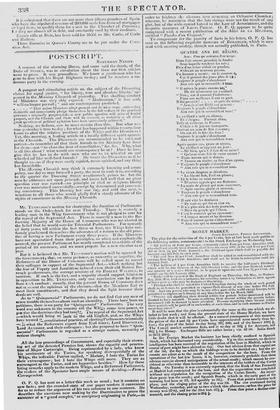Mr. TENNYSON'S motion for shortening the duration of Parliaments stands
on the Order-book for next Thursday. There is scarcely a leading man in the Whig Government who is nut pledged to vote for the repeal of the Septennial Act. There is scarcely a man ia the Re- forming Majority of the House of Commons who was not elected in the belief that he would vote for Triennial Parliaments. For upwards of forty years, till within the last three or four, the inigs have uni- formly proclaimed themselves the advocates of a return to the old prac- tice of having u new Parliament every three years. If the Miuisters have-not apostatized from their principles, so often and emphatically avowed, the present Parliament has nearly completed two-thirds of the period of its existence, and we must prepare for a new election nest year. But it is believed that Mr. TENNYSON'S motion will be opposed by the Governinint; that, on some pretence, as unworthy as impolitic, the Reformers of the House of Commons will be called upon to record their suffrages in support of the Septennial Act,—which nothing but the fear of Popery and Jacobitism induced even their old Rotten Bo- rough predecessors, the corrupt minions of Sir BORERT WALPOLE, to sanction. If such is the fact, and a majority should support AI inistvrs in opposition to Mr. TENNYSON, only one conclusion can be drawn from a telt conduct : namely, duet the present House of Commons does not t esresent the opinions of the electors—that the Members fur to meet their constituents, and that they dread the light because their deeds are evil.
As to " Quinquennial" Parliaments, we do not find that any men of sense trouble themselves about suchen absurdity. There have been no petitions, there is no party for "Quinquennial" Parliaments, . The very word was unknown in the country till the Whig; came into power, to aetise the doctrines they haedtausIst. The repeal of the SeptennialAct —which would bring us leek to the old English, and, as the Whigs have termed it, constitutional practice, of electing Parliaments triennially -Arnat the Reformers expect from Earl GREY, Lord BROUGHAM, Lord A LTIIORP, and their colleagues : but the proposal to have " Quin-. quennial" Parliaments is regarded as a strange notion, unworthy ut serious thought.


















 Previous page
Previous page